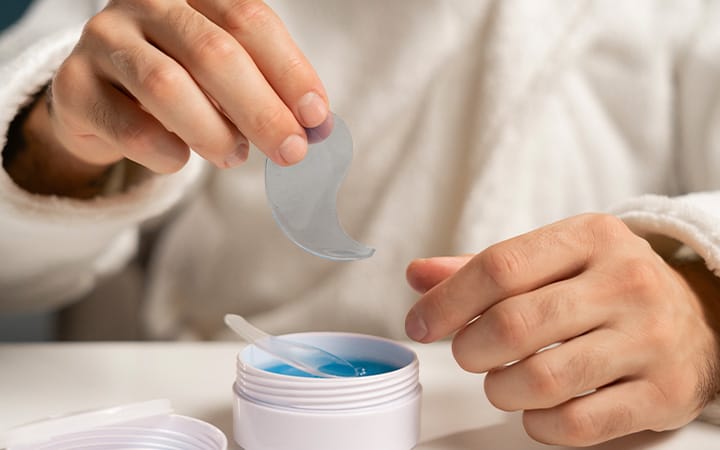Skin Trends, Rated: What’s Worth It and What’s Not
July 30, 2025

With new skincare and cosmetic trends going viral nearly every week, it’s easy to feel unsure about what’s best for your skin.
From slugging to sunscreen, Nicole Bort, CNP, a certified nurse practitioner in dermatology at University Hospitals, rates the most buzzed-about treatments, separating which trends are smart skincare and which you might be better off skipping.
(Scale of 1 – 10: 1=no research to support it, 10=proven by research.)
Collagen Supplements – 4/10
Taken from animal or fish connective tissues, these supplements have become a popular way to pursue better skin, hair and nail health. Bort’s verdict? There’s no evidence that taking collagen powders or pills will improve your skin, hair or nails.
“Collagen supplements are safe but not very effective. Plus, they’re expensive,” Bort says. “They should never replace proven anti-aging tools like sunscreen and retinoids.”
Wrinkle Patches – 3.5/10
Made from silicone or paper, sometimes with added ingredients like hyaluronic acid or retinol, adhesive wrinkle patches are thought to soften lines by limiting movement.
“They’re basically stickers for adults,” Bort says. “They offer no long-term prevention, and they’re not great for sensitive skin or anyone with adhesive allergies.”
Ice Facials – 4/10
As its name suggests, an ice facial involves applying ice –either actual cubes, devices contoured to the face or immersion in icy water – to reduce puffiness and redness.
“This wouldn’t do anything for collagen or long-term skin health,” Bort says. “Plus, overuse of ice could damage capillaries in the skin or worsen rosacea.”
Slugging – 6/10 (most skin types), 8/10 (very dry or sensitive skin)
This K-beauty (Korean skincare-inspired) trend involves sealing in moisture with a layer of an occlusive product like petroleum jelly.
“It’s excellent for eczema or irritation from active ingredients,” says Bort. “But it’s not great for acne-prone or oily skin, because it can trap bacteria or worsen milia. And avoid it completely if you’re using retinoids.”
Snail Mucin – 7.5/10
Lightweight and gentle, snail mucin—an emollient secretion from live snails—is another favorite K-beauty product for hydrating sensitive or dry skin.
“Snail mucin is usually well tolerated, but there’s no long-term clinical evidence supporting it,” Bort notes. “Also, there are ethical concerns around how it’s sourced. Extraction from snails isn’t always cruelty-free.”
Face Tape – 2/10
Often seen in TikTok transformation videos, face tape pulls the skin tight for a temporary lift.
“It’s like Spanx for your face,” Bort says. “The effect only lasts while the tape is on, and it can irritate or damage delicate skin.”
Jawline Filler – 6/10
This non-surgical treatment uses injectable fillers, often hyaluronic acid, to reduce wrinkles or sagging skin along the jawline. When performed by a highly skilled injector, it can provide dramatic results.
“The technique is everything,” says Bort. “Filler is adjustable and reversible, but it’s temporary, pricey and can look bulky or unnatural if overdone.”
Buccal Fat Removal – 3/10
This surgical trend removes fat from the cheeks to create a slimmer look.
“It’s best reserved for people with very full cheeks,” Bort cautions. “Facial fat naturally declines with age, so removing it too early can make you look hollow or gaunt later. It’s irreversible and regret is common in the wrong candidates.”
Skin Cycling – 8/10
This structured approach to skincare is a daily regimen alternating retinoids, exfoliants and rest days to reduce irritation.
“It’s a smart approach that minimizes side effects,” Bort explains. “But it’s not ideal for people already using prescription-strength retinoids. Daily use may offer better results in those cases.”
Sunscreen – 10/10
Applying broad-spectrum SPF 30 or higher is a trend Bort says should never go out of style, preventing photoaging, pigmentation and even skin cancer.
“No trend tops this one!” she says. “It’s not just effective, it’s the most important product in your skincare routine. It’s a proven anti-aging product, and it’s much cheaper than Botox.”
While social media trends may be fun to follow, Bort adds, when it comes to skincare, it’s best to stick with evidence-based practices.
“Sunscreen and retinoids will always outperform the fads,” she says. “Don’t get distracted by the noise—your skin deserves better.”
Related Links
Dermatologists at University Hospitals provide the latest diagnostics techniques and services for a wide range of skin conditions.
Tags: Skin Health, Nicole Bort, CNP


